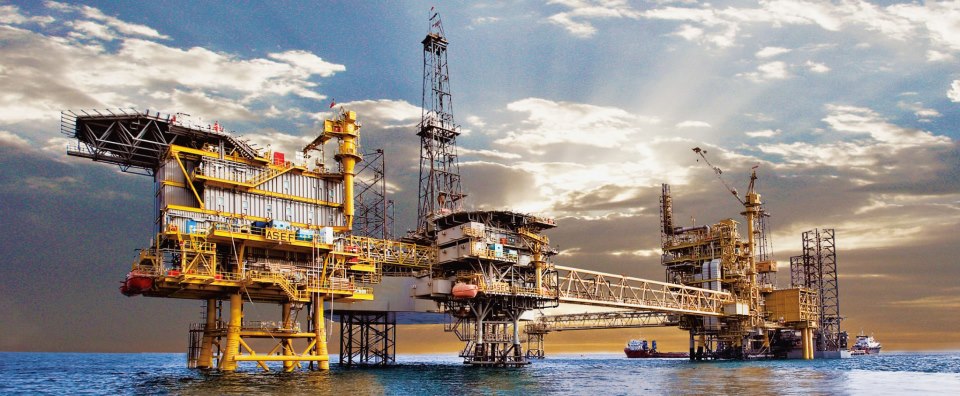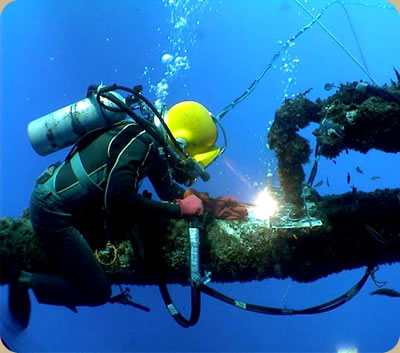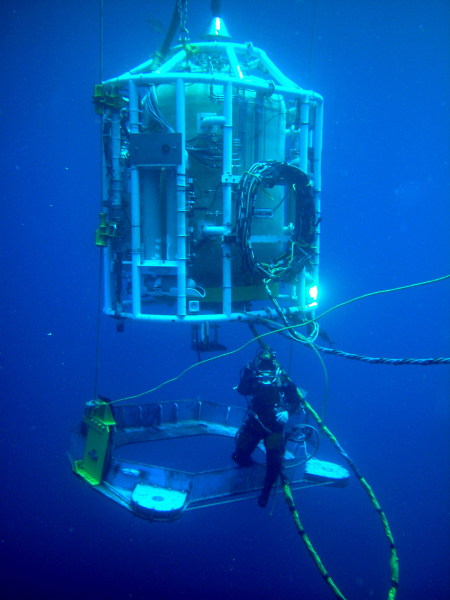Careers in Diving
- The Subsea Industry
- Critical Skills shortages
- Offshore Air Diver
- Saturation Divers
- Inshore Air Diving Supervisor
- Offshore Air Diving Supervisor
- Offshore Air Diving Supervisor
- Why choose the Professional Diving Academy?
The Subsea Industry
- The UK subsea industry sector leads the world in experience, innovation, services and technology
- Has over 750 companies with over 53,000 employees
- Worth GBP £8.9 billion in services and products
- Will continue to lead the world by sustaining and expanding this vital business sector
- UK trained commercial divers are arguably considered as the best in the world
- The Professional Diving Academy continues to lead the way in innovative course development and implementation
2018 Industry Overview
- The US shale revolution and oversupply by Saudi Arabia and other OPEC members saturated the global marketplace causing a collapse in 2014.
- When oil is cheap operators will postpone maintenance and repair contracts, which reduces the amount of diving work that would normally be carried during a season.
- OPEC has reduced production, whilst production from non OPEC members such as Venezuela, Brazil and Norway has also declined. Meanwhile demand has increased.
- The ‘futures’ price for a barrel of Brent Crude is trading well above $60 as far out as 2025 and it is predicted by many annalists to break through the $100 a barrel by late 2019.
- Projects put on hold from 2014 are now being scheduled, whilst new maintenance repair requirements are added.
- There has been marked increase in the amount of oil/gas related diving work in 2018.
- There has been massive growth in offshore renewable energy infrastructure since 2008
- Two thirds of the world’s offshore renewable industry is based in the UK and surrounding northern European waters.
- HSE trained divers have been at the heart of this energy revolution and have supported sub-surface construction activities which will continue to grow as new build projects are commissioned and maintenance and repair requirements become more prevalent.
- The number of major saturation diving vessels has increased significantly over last five years – a true reflection of future job prospects and investment going into the industry at this time.
- A lack of succession planning throughout the early part of the new millennium has left a significant skills gap and critical shortage of qualified, experienced personnel.
- Divers in the fifty plus age bracket are retiring or moving into supervisory or client advisory roles.
Offshore Air Diver
Supporting subsurface construction, inspection and maintenance projects associated with the production of oil and gas and renewable ‘green’ energy.
- Qualification Required UK Waters: HSE Surface Supplied Top-Up or an ‘HSE recognised’ equivalent qualification
- Qualification Required International Waters: HSE Surface Supplied Top-Up or an ‘IMCA recognised’ qualification
The North Sea has controlled rates of pay through the Offshore Diving Industry Agreement (ODIA) which dates back to the early 1980s. This is 3-year collective agreement between 7 diving contractor companies and the RMT trade union, governing minimum rates of pay, allowances and health/injury insurance for UK North Sea diving personnel. Many diving companies who are not part of ODIA also work closely to the agreement and as a result, through negotiation with their clients, pay rates for air divers working on ‘offshore diving projects’ around UK waters are approx. GBP £600 per day.
In other parts of the world offshore pay rates and conditions vary considerably. An overall average for a UK qualified air diver working in offshore regions across the world in 2018 would be approx. USD $350 – $550 per day.
Working Terms:
- North Sea: Up to 28 days offshore – 12 hour days
- International: 50 to 90 days offshore – 12 hour days
Inshore Construction Diver:
- Qualification Required UK Waters: HSE Surface Supplied or a ‘recognised’ equivalent qualification
- Qualification Required International Waters: HSE Surface Supplied Top-Up or ‘recognised’ national qualification
- Many inshore divers will start out as self-employed freelancers although a few may be taken on as permanent staff with diving company when they have established themselves
- Hours of work are typically 10-12 hours a day and depending on the proximity of the dive site to the diver’s home town may require the team to be away from home throughout the working week or in some cases for the duration of the project. Expenses such as travel, food and hotel bills are normally met by the company.
Salaries in the inshore sector vary considerably depending on the company, the type of contract and the experience of individual divers, however the following can be used as an approximate guide for a diver working regularly with an inshore company:
- Aquaculture industry: GBP £30k – £35k per annum
- Marine construction/maintenance: GBP £35k – £55k per annum
- Renewable energy projects: GBP £80k – £100k per annum
Despite being inside the UK’s 12 mile limit – technically classed as inland/inshore – many offshore wind farm diving projects are conducted under the HSE offshore ‘Approved Code of Practice’ (ACOP) which means that divers will require an offshore diving certificate. Salaries for divers working regularly on offshore wind projects can exceed £100k per annum.
Offshore Certificates Required:
- Global Wind Organisation (GWO) Safety Course Package
Inshore work is very diverse and covers everything associated with construction, demolition, remedial works, salvage and inspection. More recently working with renewable energy companies who specialise in areas such as offshore wind and wave generators, have allowed many inshore divers to gain well paid employment on contracts that still fall under the inshore diving regulations.
The job can often mean long days and hard work, but it can be extremely satisfying to be part of team who must trust and rely on each other, even in the worst of weather! Because of our connection with the diving industry through our ADC registered sister company Shearwater Marine Services, the training you receive here at the PDA closely simulates the working environment mentality that you will need to be a success. We also ensure that many of the hydraulic and pneumatic tools that you are likely to use in the commercial world, are used during training in a realistic, safe manner and most importantly under work type conditions.
Saturation Divers
- Qualifications required: HSE Surface Supplied Diver, HSE Wet Bell/Top up and Closed Bell Diver
To get to this stage, divers are expected to be proficient offshore air divers before attending a saturation diving course. The course is expensive at approx GBP£20,000, so it is worth ensuring that satisfactory experience has been attained before committing. The mixed gas/closed bell diving course is generally 3 weeks long at an IMCA approved training school. In the North sea, the time in saturation (including decompression) is limited to 28 days. A typical crew consists of three teams of 2 or 3 divers on a 24 hour rotation of 8 hour shifts. Each shift includes six hours of work time at the dive site and 2 hours for transfer from chamber to bell to dive site and back again.
Salaries in this sector are wildly variable and most divers are self-employed. Saturation divers working in the North Sea benefit from the ODIA/RMT pay rate agreement and as such can expect to earn over GBP £1500 per day. In other parts of the rates and conditions vary considerably and are sometimes very much dependant on nationality. An overall average for a saturation diver working in offshore regions across the world in 2014 would be approx. US $1200 – $1500 per day.
Inshore Air Diving Supervisor
An Inland Air Diving Supervisor is normally an experienced and qualified air diver who has been appointed by the company following an assessment of knowledge and leadership skills. The UK’s Association of Diving Contractors (ADC) now has an examination programme in place which assesses these leadership skills as well as other important attributes such knowledge of risk management, emergency procedures and regulatory requirements. Many ‘client companies’ now insist that inshore diving supervisors have this qualification as a minimum, before allowing diving work to commence.
Offshore Air Diving Supervisor
The International Marine Contractors Association (IMCA) is the world’s leading trade body for commercial diving and related marine matters. To be a Supervisor in an offshore environment it is necessary to have an IMCA qualification or an equivalent such as AODC.
Experienced divers can progress to Trainee Diving Supervisor through a certification scheme for offshore diving supervisors which sets down minimum requirements. These include relevant diving experience, basic theoretical training, supervised ‘hands-on’ experience offshore, and a multi-choice theory examination. Examinations now provide compulsory modules relating to air diving supervision, mixed gas (or bell) diving supervision. Candidates also sit optional legislation modules relevant to the parts of the world in which they expect to work. Modules for the UK and Norway currently exist.
Supervisors also pass on information and knowledge gained from their own work experience to the trainee divers. The safety of divers is paramount and is the Supervisor’s responsibility.
Additional Qualifications and Experience
As a diver you should consider what you are bringing to the industry. What we mean by this is that although we can teach you to dive, you must think about what you are going to do when you get to the jobsite. Are you practical? A problem solver? Good with your hands? Do you have experience in the construction industry? Have you worked on a building site? Are you a qualified rigger? etc.
Some topside skills which ‘might’ make the difference to a company accepting you for a job ahead of another diver:
- Engineering Qualification
- Mechanical/Electrical skills
- Diver Medic Technician
- Rigger/Slinger
- Crane Banksman
- Construction Site Experience
- Welder fabricator
- RYA Powerboat Certificate (Safety Boat Duties)
- Diving Helmet/Band-Mask Maintainer
Remember the majority of time on a worksite you will not be diving. A great deal of the time is spent preparing for the job, getting equipment ready and checking it is safe for use, rigging loads ready to go underwater and reviewing how the job can be carried out safely and efficiently on a continuous basis.
Offshore Certificates Required:
- Basic Offshore Safety Induction and Emergency Training (BOSIET)
- Minimum Industry Safety Training (MIST)
- Offshore Safety Passport (OSP) – Some Far East Projects
Why choose the UK’s HSE qualification?
In the early days of North Sea Diving, safety standards were poor which resulted in several serious accidents. The UK Government and the diving industry responded by creating what is deemed by many to be the best guidelines for commercial diver training in the world.
Much of these original procedures were adopted in other parts of the world and the International Marine Contractors Association (IMCA) the world’s offshore diving trade association, has also created a huge amount of guidance, utilising experiences from diving around the world. The Professional Diving Academy is an active member of this forum, contributing regularly to improvements in diver safety and learning.
The UK is the world leader in the creation of safe diving practices and techniques. All of the courses recognised by the International Diving Regulators (IDRF) Forum are based on the original HSE syllabus. This includes Australia, Canada and South Africa. The HSE has now progressed onto an improved competence based training system, allowing the PDA to implement a more advanced training approach than its predecessors.
Why choose the Professional Diving Academy?
The Professional Diving Academy and its ADC accredited sister diving company, Shearwater Marine Services, are at the heart of the diving industry. Through HSE, IMCA and ADC we contribute regularly to improvements in diver safety and learning. We understand fully where the industry is going, how it is changing and what training courses we need to develop and deliver to keep apace.
The mantra “owned and run by divers, for divers,” started right here, and with decades of experience in all aspects of the diving industry we can always ensure that our courses are run in real life conditions.
You will dive in a vast variety of conditions from:
- Cold, clear freshwater lochs
- Beaches
- Tidal sediment and soft sea-beds
- Harbour piers and jetties
- Vessels and barges
- Deep, dark exposed drop-offs
- Mid-water tidal
Through word of mouth we are arguably one of the best diver training schools in the world. We would encourage anyone considering a future diving career to thoroughly research your training options before committing to a training provider. If possible try visiting us for a commercial diving taster day which we still run free of charge.



